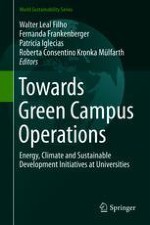2018 | OriginalPaper | Buchkapitel
Sustainable Campus Model at the University of Campinas—Brazil: An Integrated Living Lab for Renewable Generation, Electric Mobility, Energy Efficiency, Monitoring and Energy Demand Management
verfasst von : Luiz C. P. da Silva, Marcelo G. Villalva, Madson C. de Almeida, José L. P. Brittes, Jorge Yasuoka, João G. I. Cypriano, Daniel Dotta, José Tomaz V. Pereira, Mauricio B. C. Salles, Giulianno Bolognesi Archilli, Juliano Garcia Campos
Erschienen in: Towards Green Campus Operations
Aktivieren Sie unsere intelligente Suche, um passende Fachinhalte oder Patente zu finden.
Wählen Sie Textabschnitte aus um mit Künstlicher Intelligenz passenden Patente zu finden. powered by
Markieren Sie Textabschnitte, um KI-gestützt weitere passende Inhalte zu finden. powered by
